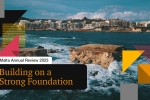Crafting a better future for Malta
As our world grapples with the unequivocal impacts of climate change, the past year provided us with a glimpse into the future that awaits us. In the summer of 2023, we witnessed the hottest three-month period on record, accompanied by unprecedented sea surface temperatures and a significant decline in Arctic sea ice coverage. Extreme weather events have wreaked havoc across the globe, and the decline of nature and biodiversity remains an alarming global concern.
As the world scampers to respond to the imminent threats of climate change, the European Union has emerged as a pivotal player on the international stage. Amidst all the challenges, an evident shift is underway in discussions about the path to achieving net zero goals. Although we speak of ‘keeping 1.5°C alive’, increased ambitions and negotiations, fueled by the collective efforts of individuals, communities, governments and businesses, make every little bit count in the race to solve some of the world's most urgent crises.
While the events unfolding on the global stage may at times feel distant, as a country, Malta faces its own challenges. Despite ongoing investments on a national scale, we continue to struggle to achieve sustainable mobility, both in terms of traffic congestion and the general decarbonisation of transport. Energy independence remains a top priority, as the country seeks to diversify its sources of energy and scale up investments in renewable energy. These initiatives will be key to the achievement of Malta’s 2030 targets under the Effort Sharing Regulation, both in terms of emission reduction and energy consumption from renewable sources.
As Malta continues to urbanise, achieving energy efficiency, particularly within our building stock, will remain paramount. This involves increasing the standards of new builds but also the importance of retrofitting existing properties simultaneously. While recognising that a lot has yet to be done, the review of Technical Document F and the related funding schemes linked to renovation are both welcome initiatives in this space. Linked to this are the high volumes of generated construction, demolition and municipal waste along with the low rates of recycling which remain major challenges in the local context.
All this in the light of an economy facing strong inflationary pressure, an ever-changing regulatory environment and the likelihood of a new corporate tax regime, which together sustain economic uncertainty for both large businesses and SMEs alike.
Ultimately, the government, business community and the general public need to come together to face these challenges and create the change Malta needs. As we embark on this journey, our aim as PwC is clear: to help all stakeholders craft a sustainable future together.

How we're playing our part
We’re raising the sustainability agenda
Over the past year, we have been actively championing the cause of responsible business practices and seeking to drive home the urgency of the sustainability agenda. We have hosted a series of impactful sustainability-related events that have brought together local leaders, industry experts, and key clients to explore the world of sustainability and ESG initiatives alongside us.
Case study
Working with key local organisations
We have actively engaged with a diverse range of both public and private sector clients in supporting them on their journey towards a more sustainable transition. Within this role, we have been working closely with the Malta Institute of Accountants (MIA) on a number of areas, including consultations in relation to the adoption of the Corporate Sustainability Reporting Directive (CSRD) and the European Sustainability Reporting Standards (ESRSs), the transposition of the CSRD in Malta and the changing role of the profession as a whole. In tandem, we have also been part of the Malta Financial Services Advisory Council (MFSAC) in developing its strategy around sustainable finance and how best to tap into the market potential that exists, whilst acknowledging the market limitations for a small island economy.
In light of a changing reporting landscape, we have played a pivotal role this year in consulting with the Ministry for Environment, Energy and Enterprise (MEEE) on ways to encourage local businesses to report sustainability information and the development of the new Malta Enterprise scheme, aimed at assisting SMEs with reporting ESG information. We have also been appointed as approved advisors for this initiative, enabling businesses to leverage the scheme to benefit from consultancy services and begin their ESG journey.

As a leading voice for business in Malta, this past year we have strengthened our partnership with the Malta Chamber and collaborated closely on numerous fronts, including the delivery of insight sessions on ESG, the creation of the Malta Chamber Think Tank and participation in various business sectors. Our engagement with the Malta Chamber further reflects our commitment to share knowledge, collaborate and advocate for sustainable practices across the business landscape in Malta.
Case study
Launch of the first ESG CPE course
In recognition of the need to support various industries with specific training around ESG, we have launched the first Comprehensive ESG Programme for all professionals who are involved, to some degree, in sustainability. This Programme comprises nine in-depth sessions covering the fundamentals of ESG, the Corporate Sustainability Reporting Directive (CSRD), tax implications of ESG, ESG strategy and business transformation, and the technology facets of ESG. These sessions equip attendees with the latest insights and skills to drive sustainable change in their respective areas of competence. Taking into consideration the continued market interest in certified professional education, we expect this course to be repeated again in FY24.
We’re assisting organisations to understand and prepare for CSRD
These past twelve months have been a tumultuous time for sustainability reporting, with the legislative process around CSRD being approved and the consultations around the ESRSs being finalised. In light of these achievements, we have been increasingly focused on guiding and empowering our clients through the complexities surrounding this regulatory requirement. In this respect we have sought to initiate conversations with the boards of most of our clients, to drive home the urgency of preparing for CSRD.
This has created a space for open dialogue and in-depth discussions surrounding the implications around double materiality and key metrics that will need to be disclosed. Our role in this respect aligns with our broader role in the financial services sector and our purpose to build trust in society by ensuring that sustainability-related disclosures are accurate and can indeed be relied upon. In our bid to play our part in solving the issue of climate change, we believe that having robust, independently verified disclosures will be a key part of the green transition.

Case study
Assistance with undertaking a double materiality assessment and gap analysis
We assisted a large listed entity with carrying out a double materiality assessment to identify which sustainability matters are most material to the organisation and its stakeholders. This was a foundational first activity to determine which ESG matters are most relevant to the entity, to then determine which reporting standards, disclosures and data points should be included as part of a future sustainability report. This was then complemented by a gap analysis to identify gaps between the entity’s current reporting and the CSRD reporting requirements outlined by the ESRSs. This resulted in the client having a clearer way forward in terms of new metrics, data and disclosures that would soon become mandatory.
Case study
Provision of GHG limited assurance
In supporting a large local manufacturer headquartered in Malta with preparing for CSRD, we carried out a limited assurance engagement over their Scope 1 and Scope 2 Greenhouse Gas (GHG) emissions as they strive to improve their commitment to environmental responsibility and community engagement. As part of this process and the conversation around making the transition towards CSRD, we have begun undertaking a double materiality assessment to understand the key risks, impacts and opportunities facing this entity.

We’re helping clients tackle their carbon emissions
Although reporting is an imperative starting point, recognising the urgency of reducing organisational impacts is the next critical step. Given the urgency of tackling emissions, we have been supporting a number of industry players with addressing their carbon emissions beyond mere disclosure. Here we are providing support to enable our clients to take a proactive commitment to mitigating their environmental impacts.
Case study
Sustainability and emissions reduction
We have recently embarked on a project with a major logistics operator in Malta to support them in conducting a thorough assessment of their operations to drive sustainability and emissions reduction. We are assisting them in examining their own operations, as well as their value chain, and measuring their Scope 1, 2 and 3 emissions to identify areas in which emissions can be reduced. This assessment will serve as the foundation for developing and implementing an emissions reduction strategy with the goal of decarbonising their operations and generating positive, tangible impacts on the environment.

We’re supporting the industry in navigating the tax implications of ESG
An important part of the conversation relates to green taxes and incentives. With the onset of various regulations and more onerous reporting on the horizon, we have also been actively involved in assisting clients navigate the tax implications associated with ESG initiatives. Our support has included helping our clients understand the broader financial landscape that surrounds ESG, ensuring that they remain compliant with regulations while maximising tax efficiencies.
Case study
ESG-related grant schemes and tax incentives
We have also supported a number of clients accessing both nationally funded and EU-funded grant schemes designed to support ESG initiatives. These range from the purchase of energy-efficient machinery and equipment to assistance with unlocking funding related to building renovation.
We also supported our clients with accessing other schemes to benefit from advantageous tax credits, including the Investment Aid for Energy Efficiency Projects Scheme, which supports businesses undertaking investment projects to achieve improved energy efficiency, and the Change to Grow Scheme, aimed at incentivising SMEs to embark on new investment projects geared towards strengthening business activities and using more sustainable practices. In doing so, we have urged businesses to look beyond mere compliance, encouraging them to recognise that sustainability is not only good for the planet but also a driver of profitability.

We’re driving national policy and assisting the local government in creating change
While the role of industry and business is clear, overcoming these challenges will require governments and the public to work together to create change. As policymakers, governments are key drivers of incentivising organisations to be part of a more sustainable future, while as policy implementers they serve as role models of how to implement and operationalise ESG-related policies effectively.
Case study
Support to the Ministry for Environment, Energy and Enterprise
We have been supporting the local government with implementing policies surrounding ESG. This included in-depth consultations with the MEEE on ways to improve reporting of ESG metrics through their portal, how best to prepare local businesses for CSRD, how to expand such reporting to SMEs, including the recently launched ESG Grant Scheme for SMEs, and setting a vision for eventual verification of this information.


Case study
Support to the Renovation Wave
Our ESG team has been supporting the Public Works Department (PWD) within the Ministry for Public Works and Planning with the implementation of its Renovation Wave Project, financed through the Technical Support Instrument (TSI) financed by the European Commission.
This project seeks to assist the PWD with improved technical knowhow, methodologies and tools for designing, procuring and supervising deep energy renovations while increasing awareness among the general public, public authorities and private sector stakeholders about the benefits and best practices of building energy renovation in the Maltese context.
We’re investing in ESG training and upskilling
In this ever-changing landscape, the importance of ongoing training cannot be understated. Our team has more than doubled in size in the year under review, which stands as a testament to the increasing demand for the skills and investment being made in the realm of ESG.
As we expand our team, we also expand our capabilities. We have embedded sustainability expertise in every line of service we offer, introducing dedicated sustainability teams across all areas to ensure that sustainability is integrated into the core of our solutions. Together, we collaboratively leverage each other’s diverse skill sets, allowing us to deliver the full range of sustainable solutions for our clients. Whether it is advisory, assurance or tax, this union of ideas and expertise ensures that we provide holistic, well-rounded guidance to our clients.
Moreover, recognising that sustainability reporting is right on the horizon, we are diligently preparing our assurance practice to be equipped with the tools necessary to meet the evolving needs of the industry.
Through our efforts to upskill our workforce and recruit talented individuals, we aim to place ourselves at the forefront of industry knowledge and best practices in sustainability.
Case study
PwC Climate Impact Knowledge Badge
PwC's Climate Impact Knowledge Badge represents the next generation of learning recognition for PwC professionals. This climate-specific badge provides our people with an opportunity to learn, apply and gain recognition for the knowledge and skills that our clients and our business demand in the field of ESG. The ESG team and all new recruits who have an ESG-related role are encouraged to complete this course and become certified badge holders, a testament to our continued commitment to transforming how we work and deliver value.

We’re striving to improve our own ESG performance
As a firm, we recognise that climate change is one of the most urgent issues facing our planet and that the decade to 2030 will be crucial for stepping up climate action. In this respect, PwC is committed to a net zero pathway and has set near-term (2030) science-based targets for reducing its emissions in line with a 1.5-degree climate scenario. In July 2021, our near-term emission reduction targets were independently validated by the Science Based Targets initiative (SBTi) and we are currently working to decarbonise our operations and supply chain as well as to adapt our business to the risks and opportunities presented by a net zero future.
Our commitment is to reduce our scope 1 and 2 emissions and our business travel emissions by 50% in absolute terms by 2030 (from a 2019 base). In addition, PwC will transition to 100% renewable electricity in all territories by 2030. We will also engage with key suppliers, encouraging and supporting them to achieve net zero. As a global firm, we commit that 50% of our purchased goods and services suppliers by emissions will have set science-based targets to reduce their climate impact by FY25. Finally, to mitigate its impacts today, we continue to offset our emissions through high-quality carbon credits, transitioning our carbon credit portfolio to 100% carbon removals by FY30. Further information on progress towards achieving net zero can be found here.

Explore
PwC Malta Annual Review 2023
Contact us
















